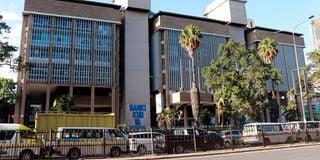Premium
Inflation rates, interests rates and the rising cost of food

The Central Bank of Kenya head office in Nairobi. CBK's official exchange rate for the US dollar is Sh121.45. But if you are buying today, expect banks to charge you Sh126 and above. If you are selling, you might get Sh123 for the dollar.
What you need to know:
- In Kenya, we can expect to see a decline in the capital account surplus.
- Generally, more dollars come into the economy than leave, mainly because of high remittances and investments.
- This surplus could, however, decline as investors switch to US assets.
Central Bank of Kenya’s (CBK) official exchange rate for the US dollar is Sh121.45. But if you are buying today, expect banks to charge you Sh126 and above. If you are selling, you might get Sh123 for the dollar.
Why? The dollar is strengthening against most currencies globally. This is mainly because the US central bank is raising interest rates. The recent hike brought the rates up to 3.85 per cent.
In Kenya, we can expect to see a decline in the capital account surplus. Generally, more dollars come into the economy than leave, mainly because of high remittances and investments. This surplus could, however, decline as investors switch to US assets.
You should, therefore, expect to see banner headlines such as ‘Dollar crisis to worsen as foreign investors flee NSE’. Central banks are raising rates around the world. It is not that they are all grumpy middle-aged men in some conspiracy against hustlers, as right-wing populists allege.
Rather they are applying the age-old medicine to bring inflation down. CBK has also been adjusting rates upwards. The Central Bank Rate (CBR) was adjusted to 8.25 per cent in September, up from 7.5 per cent in May.
Russia-Ukraine war
This bitter medicine works, but in many countries, it has not really slowed inflation. It is not that we have too much money chasing few goods.
Rather, drought and the Russia-Ukraine war are making food expensive. Inflation has remained stubbornly high and trending in the wrong direction. In Kenya, it was 9.6 per cent in October, up from 5.1 per cent in February.
With all these adjustments, it may be confusing to know which rate you are paying on your loan, or which banks are taking you to the cleaners and which ones are fairer. To help you along, the regulator introduced the annual percentage rate to assist customers compare the full cost of loans between banks.
We all focus on the interest rate, but there are many other charges related to taking out a loan. Appraisal fees. Negotiation fees. Legal fees. Stamp duty.
Today banks are charging you anywhere from 14 per cent to 24 per cent. A neat facility to help you compare can be found at https://www.costofcredit.co.ke. Operated by the Kenya Bankers Association and CBK, it calculates the annualised total cost of credit.
Some economists say it is the interest rate medicine that is keeping the patient alive. That, left unchecked, we would soon find ourselves in a hyperinflationary situation, which would make the shilling worthless.
Others argue the link between interest rates and inflation is not working well or not at all. It is easy to be sympathetic to this lot. Why should we be depending on Ukraine for food in the first place?
I spent some time in Oyugi’s this week and visited the market there. Amazing, the amount, high quality, and quantity of food – greens, tomatoes, fish.
Yet a few hundred kilometres away Kenyans risk starvation. While international appeals for help and raising interest rates are options, we may want to consider buying food in Oyugis and taking it to Marsabit.
@NdirituMuriithi is an economist.





